🐕 Are French Bulldogs Hypoallergenic? No, here's why❌ Quick Answer: No, French Bulldogs are NOT considered hypoallergenic! French Bulldogs have a low hypoallergenic rating because they shed moderately year-round, produce significant amounts of dander, and generate typical levels of allergy-triggering proteins in their saliva and skin. While their short coat might seem allergy-friendly, these charming companions can still trigger allergic reactions in sensitive individuals. 🐾
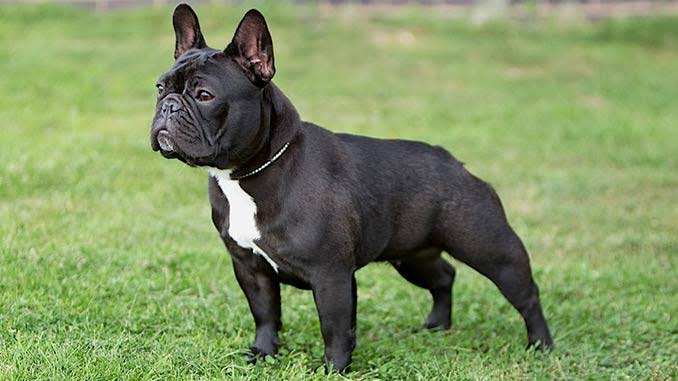
French Bulldogs are beloved companions, but their moderate shedding makes them unsuitable for allergy sufferers 🐾 French Bulldog Quick FactsHypoallergenic Level: ❌ Low
Shedding Level: Moderate
Size: Small
Weight: 9-12 kg (20-28 lbs)
Height: 28-33 cm (11-13 in)
Grooming Needs: Moderate
🔬 What Makes Dogs Hypoallergenic↑ Back to MenuUnderstanding what makes a dog hypoallergenic is crucial for allergy sufferers seeking a canine companion. The term "hypoallergenic" doesn't mean completely allergen-free, but rather indicates breeds that produce fewer allergens and are less likely to trigger allergic reactions. 🧬 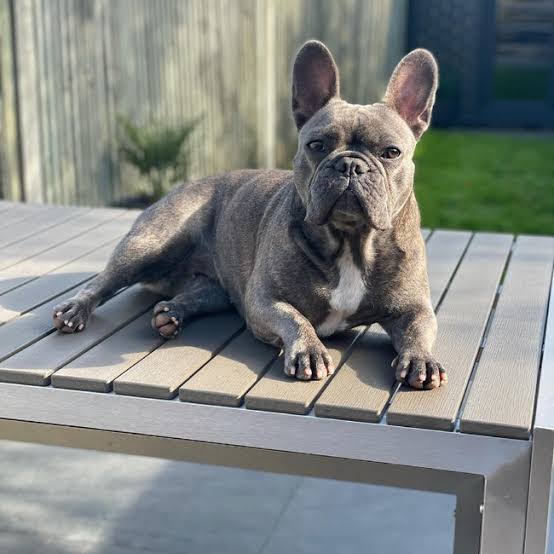
Despite their adorable appearance, French Bulldogs produce allergens like most other breeds The primary allergen sources in dogs include: Dander: Microscopic flakes of dead skin that become airborne and settle on surfaces throughout your home. Dogs constantly shed these particles as their skin cells naturally regenerate. Saliva proteins: The Can f 1 protein found in dog saliva is a major allergen trigger. When dogs lick themselves, this protein transfers to their fur and spreads throughout the environment. Urine: Contains proteins that can trigger allergic reactions, particularly in enclosed spaces or areas where accidents occur. Fur and hair: While not allergens themselves, they act as carriers for dander, saliva, and other allergenic particles, distributing them throughout your living space. Truly hypoallergenic breeds typically share these characteristics: They have hair instead of fur (which grows continuously and sheds minimally), produce significantly less dander, have single coats without undercoats, and require regular professional grooming to maintain their low-allergen status. These breeds often have predictable, non-shedding coat types that trap allergens rather than releasing them into the air. ✨ ❌ Why French Bulldogs Aren't Hypoallergenic↑ Back to MenuFrench Bulldogs, despite their compact size and short coat, fall short of hypoallergenic standards for several important biological and genetic reasons. Understanding these factors helps potential owners make informed decisions about whether this beloved breed fits their health needs. 🔍 
The short, smooth coat of French Bulldogs still sheds regularly, releasing dander into the environment 🌟 Moderate Year-Round Shedding: French Bulldogs have a short, smooth, fine coat that sheds consistently throughout the year. While individual hairs are small, they accumulate on furniture, clothing, and floors, carrying dander and allergens with them. The shedding intensifies during seasonal changes, particularly in spring and fall. 🌟 Significant Dander Production: Despite their small size, French Bulldogs produce substantial amounts of dander. Their skin naturally regenerates every three to four weeks, releasing countless microscopic particles into the air. These particles remain airborne for extended periods and settle on all household surfaces. 🌟 Skin Fold Challenges: The characteristic wrinkles and skin folds of French Bulldogs create warm, moist environments where allergens accumulate. These folds require regular cleaning but can harbor bacteria, yeast, and concentrated allergen deposits that become airborne during daily activities. 😔 🌟 Normal Saliva Protein Levels: French Bulldogs produce typical levels of Can f 1 and other allergenic proteins in their saliva. Their frequent self-grooming behavior spreads these proteins across their entire coat, which then transfers to human skin, clothing, and home furnishings. 🌟 Double Coat Structure: While subtle, French Bulldogs have a fine undercoat beneath their topcoat. This double-layer structure traps more dander and allergens than single-coated breeds, releasing them periodically during shedding cycles or when the dog is petted or brushed. 🤧 Can People with Allergies Live with French Bulldogs?↑ Back to MenuLiving with a French Bulldog while managing allergies is possible for some individuals, but it requires honest assessment, dedicated management strategies, and realistic expectations. The severity of your allergies and your commitment to allergen control will largely determine success. 💭 
French Bulldog puppies are irresistible, but allergy sufferers should test their reactions before committing ⚠️ Important Consideration: If you have moderate to severe dog allergies, respiratory conditions like asthma, or have experienced serious allergic reactions to dogs in the past, a French Bulldog is likely not the right choice for you. Your health should always be the priority when selecting a pet. Severe allergies can worsen over time with constant exposure, potentially leading to chronic respiratory issues or requiring you to rehome your beloved companion. For individuals with mild allergies who are determined to own a French Bulldog: Spend Extended Time with the Breed: Before adopting, visit French Bulldog owners multiple times in their homes. Spend at least 2-3 hours during each visit, touching and interacting with the dog. Monitor your symptoms for 24-48 hours afterward, as delayed reactions are common. Visit during different seasons if possible. 🏠 Medical Consultation: Work with an allergist to undergo comprehensive testing. Discuss immunotherapy options such as allergy shots or sublingual tablets, which can reduce sensitivity over time. Some allergists recommend starting immunotherapy several months before bringing a dog home. Environmental Control: Invest in high-quality HEPA air purifiers for every room where the dog spends time, especially bedrooms. Replace HVAC filters monthly with HEPA or allergen-rated options. Consider installing hardwood or tile flooring instead of carpet, which traps allergens indefinitely. 🌬️ Establish Dog-Free Zones: Designate your bedroom as strictly off-limits to your French Bulldog. This creates a sanctuary where you can sleep and breathe in a relatively allergen-free environment, which is crucial for recovery and managing symptoms. Rigorous Hygiene Protocol: Wash hands immediately after petting your dog and before touching your face. Change clothes after extended contact. Shower before bed to remove accumulated dander from your hair and skin. Keep a lint roller in every room for quick clothing cleanup. 🧼 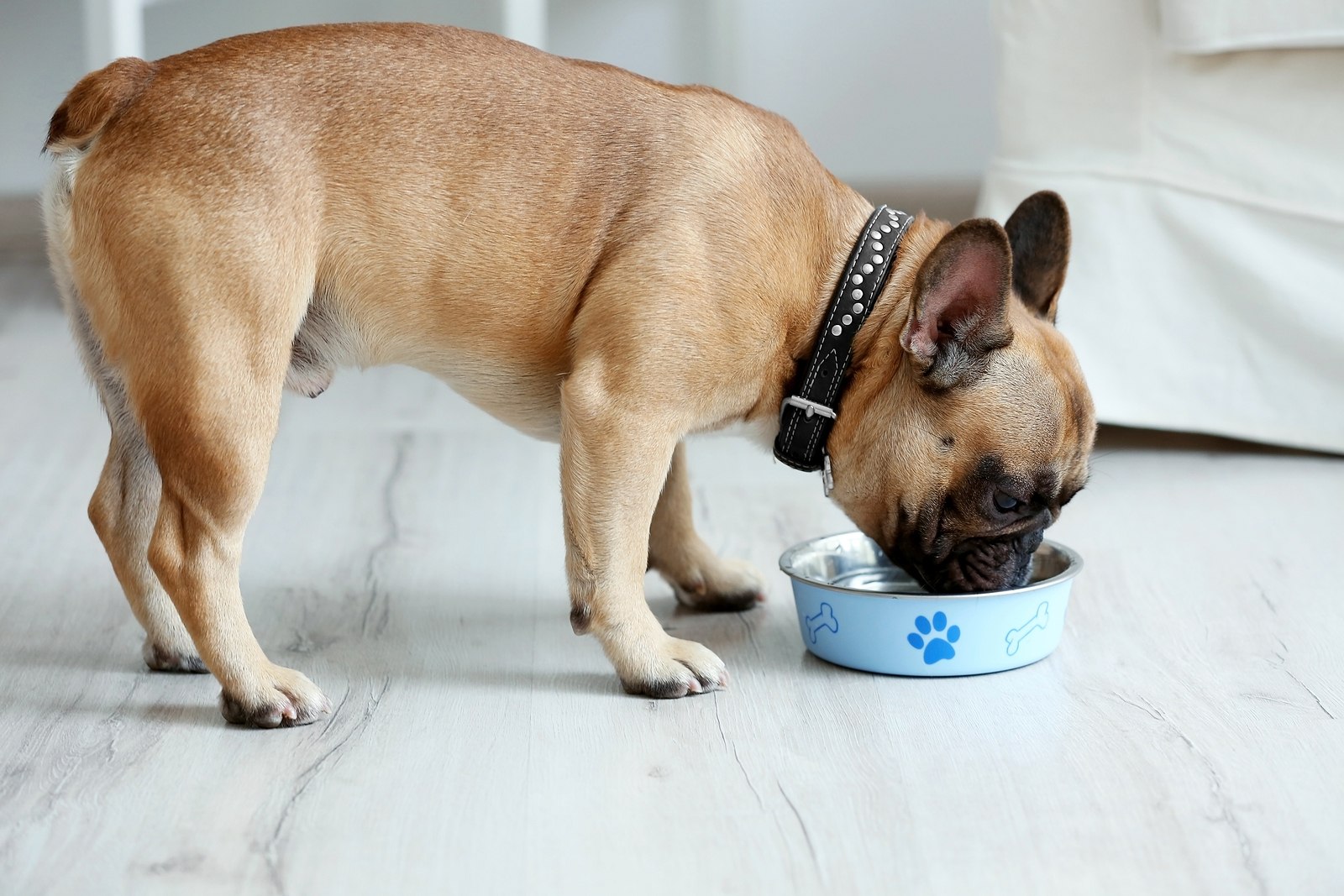
Proper nutrition can contribute to healthier skin and reduced dander production Be prepared for the reality that despite all precautions, you may still experience symptoms. Some allergy sufferers find their bodies adapt over time and symptoms decrease, while others discover their allergies worsen with constant exposure. Having a backup plan is essential—know in advance what you'll do if the living situation becomes untenable for your health. Your love for the breed shouldn't compromise your wellbeing. ❤️ 🔍 Looking for a Truly Hypoallergenic Alternative?If you're determined to find a dog that won't trigger your allergies but still want a companion with personality and charm, consider exploring breeds specifically developed for allergy sufferers. Our comprehensive breed selector can match you with dogs that offer similar characteristics to French Bulldogs while being far more allergy-friendly. Take our quiz to find the perfect hypoallergenic companion that matches your lifestyle and allergy needs! 🔄 Better Alternatives for Allergy Sufferers↑ Back to MenuIf you're drawn to French Bulldogs but concerned about allergies, several hypoallergenic breeds offer similar characteristics—compact size, affectionate personalities, moderate exercise needs, and suitability for apartment living—while producing significantly fewer allergens. These alternatives allow you to enjoy canine companionship without compromising your respiratory health. 🌟 
If you love the playful nature of French Bulldogs, several hypoallergenic breeds offer similar energy levels
Why these breeds work better for allergy sufferers: Bichon Frise: This cheerful breed produces minimal dander thanks to its continuously growing, curly coat that traps allergens. They require professional grooming every 4-6 weeks but shed very little. Their playful, affectionate nature mirrors the French Bulldog's charm. 🎀 Miniature Schnauzer: With a wiry, low-shedding double coat and minimal dander production, this spirited breed offers the loyalty and adaptability French Bulldogs are known for. They're intelligent, trainable, and excellent apartment dogs with moderate grooming needs. Maltese: Despite their flowing white coat, Maltese dogs have hair rather than fur, producing significantly less dander. They're gentle, devoted companions perfect for smaller living spaces. Regular brushing and professional grooming keep allergens minimal. ✨ Havanese: Cuba's national dog combines a hypoallergenic silky coat with an outgoing, affectionate personality. They adapt well to apartment living and form strong bonds with their families, offering similar companionship to French Bulldogs without the allergen concerns. Each of these breeds requires commitment to regular grooming, but the investment pays off in drastically reduced allergic reactions and improved quality of life for allergy sufferers. They prove you don't have to sacrifice the joy of dog ownership due to sensitivities. 💚 💡 Tips for Allergy-Prone French Bulldog Owners↑ Back to MenuIf you already own a French Bulldog or have decided to proceed despite allergy concerns, implementing comprehensive allergen management strategies can significantly reduce symptoms and improve your daily comfort. Success requires consistency, investment, and realistic expectations about symptom control. 🛡️ 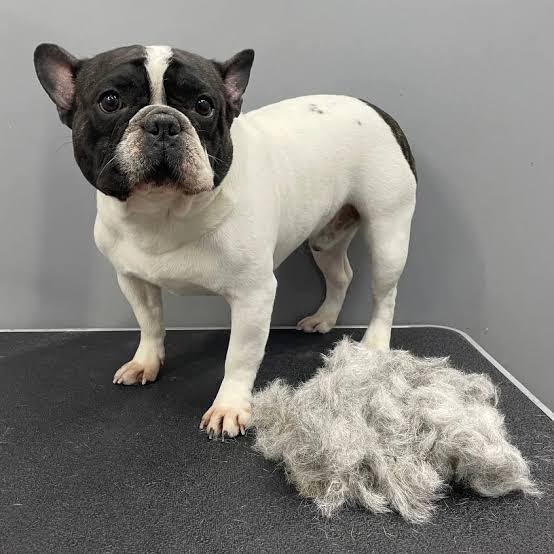
Regular grooming is essential for managing allergens in French Bulldogs 🧼 Grooming and HygieneWeekly Bathing Routine: Bathe your French Bulldog once a week using hypoallergenic, fragrance-free dog shampoo. This removes accumulated dander, saliva proteins, and environmental allergens from their coat. Ensure thorough drying, especially in skin folds, to prevent moisture-related issues. If possible, have a non-allergic family member handle bathing duties. 🛁 Daily Brushing Outdoors: Brush your French Bulldog daily outside your home using a rubber grooming mitt or soft bristle brush. This captures loose hair and dander before they spread indoors. Dispose of collected hair immediately in an outdoor trash receptacle. Wear a mask during brushing if you're particularly sensitive. Wrinkle Maintenance: Clean facial wrinkles and skin folds daily with hypoallergenic pet wipes or a damp cloth. These areas trap allergens, moisture, and bacteria. Thoroughly dry each fold afterward to prevent infections that can worsen allergen production. This should be a non-negotiable part of your routine. 🧽 Paw Cleaning Protocol: Wipe your French Bulldog's paws with pet-safe wipes after every outdoor excursion. This prevents outdoor allergens (pollen, mold, dust) from being tracked throughout your home and mixing with existing dog allergens, creating a compound allergic response. 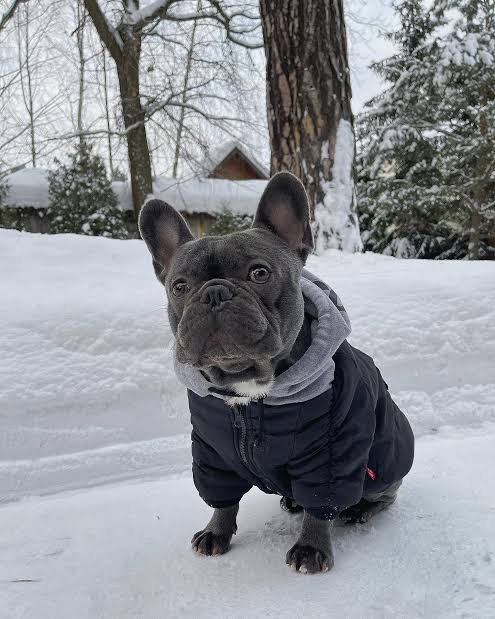
Seasonal changes can affect shedding patterns and allergen levels 🏠 Environmental ManagementStrategic Air Purification: Place HEPA air purifiers in every room, especially your bedroom (even though it should be dog-free) and wherever your French Bulldog spends the most time. Choose purifiers rated for rooms larger than your actual space for maximum effectiveness. Run them continuously, not just when symptoms appear. 💨 Flooring Choices Matter: Replace carpeting with hard flooring surfaces (hardwood, tile, laminate) wherever possible. Carpet fibers trap and hold allergens indefinitely, even with regular vacuuming. If carpet removal isn't possible, vacuum with a HEPA-filtered vacuum at least three times weekly and professionally deep-clean carpets monthly. Furniture Protection: Cover upholstered furniture with washable, tightly-woven covers that can be laundered weekly in hot water. Choose leather or faux-leather furniture for new purchases, as smooth surfaces don't trap allergens like fabric does. Keep throws and blankets minimal and wash them frequently. 🛋️ Bedroom Sanctuary: Make your bedroom completely off-limits to your French Bulldog. Use a HEPA air purifier, wash bedding in hot water weekly, and shower before bed to remove accumulated allergens from your body. This allergen-free zone is crucial for restorative sleep and symptom management. HVAC System Optimization: Install high-quality allergen-rated filters in your heating and cooling system. Replace them monthly during heavy shedding seasons and every two months otherwise. Consider professional duct cleaning annually to remove accumulated pet dander from your ventilation system. ❄️ 🍖 Nutrition and HealthOmega-3 Supplementation: High-quality fish oil or omega-3 supplements promote healthy skin and reduce dander production. Consult your veterinarian about appropriate dosage for your French Bulldog's weight. Results typically become noticeable after 6-8 weeks of consistent supplementation. Premium Diet Selection: Feed high-quality dog food with optimal protein sources and balanced fatty acids. Poor nutrition manifests in dry, flaky skin that produces excessive dander. Avoid foods with common allergens or fillers that can compromise skin health. 🥩 Hydration Monitoring: Ensure your French Bulldog drinks adequate water daily. Dehydration leads to dry skin and increased dander shedding. Provide fresh water in multiple locations and consider a pet fountain if your dog doesn't drink enthusiastically. 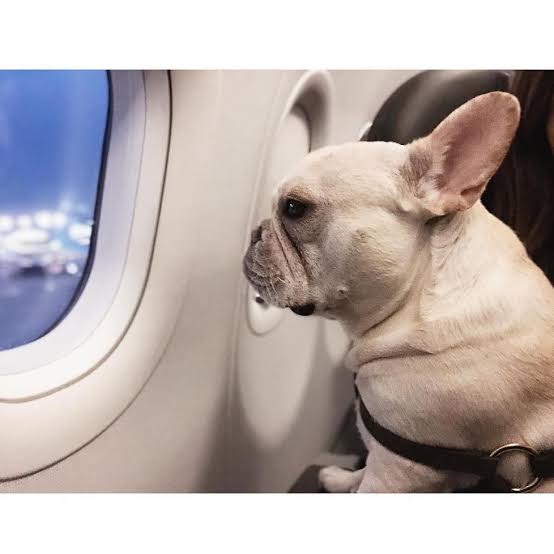
Traveling with a French Bulldog requires special considerations for allergy management ⚕️ Medical ManagementPreventive Medication: Work with your allergist to establish a preventive medication routine. Daily antihistamines, nasal corticosteroid sprays, or other prescribed medications can significantly reduce symptoms when taken consistently, not just during flare-ups. 💊 Immunotherapy Consideration: Discuss allergen immunotherapy (allergy shots or sublingual tablets) with your allergist. While requiring months to years of treatment, immunotherapy can substantially reduce sensitivity to dog allergens, allowing more comfortable coexistence with your French Bulldog. Regular Monitoring: Schedule regular check-ins with both your allergist and your dog's veterinarian. Allergies can worsen over time, and your French Bulldog's skin health may require adjustments to your management strategy. Don't ignore worsening symptoms—address them proactively. 🏥 Remember that managing allergies while owning a French Bulldog is an ongoing commitment, not a one-time fix. These strategies work best in combination, creating multiple layers of allergen reduction. Some trial and error may be necessary to discover which combination works best for your specific situation. Be patient, consistent, and willing to adjust your approach as needed. 🌈 🧪 Testing Before Adopting a French Bulldog↑ Back to MenuBefore committing to a French Bulldog, thorough testing and evaluation are essential for allergy sufferers. This process protects both your health and prevents the heartbreak of rehoming a dog you've bonded with. Investing time in proper testing now can save years of discomfort or difficult decisions later. 🔬 
Close contact, like allowing your French Bulldog in bed, will significantly impact allergy symptoms 🏥 Medical TestingComprehensive Allergy Panel: Schedule an appointment with an allergist for skin prick testing or blood tests (RAST/ImmunoCap) specifically for dog allergens. These tests identify whether you're allergic to dogs and measure the severity of your sensitivity. Results help predict how you might react to living with a French Bulldog. Request testing for Can f 1, Can f 2, and Can f 5 proteins specifically. Pulmonary Function Assessment: If you have asthma or other respiratory conditions, undergo pulmonary function testing before and after dog exposure. This objective measurement shows how dog allergens affect your breathing, providing crucial data for decision-making. Document baseline measurements for future comparison. 🫁 Professional Consultation: Discuss your test results thoroughly with your allergist. Ask specific questions about living with French Bulldogs, immunotherapy options, and realistic expectations for symptom management. An honest medical opinion should heavily influence your decision, even if it's not what you want to hear. 🐕 Real-World Exposure TestingMultiple Extended Visits: Spend time with French Bulldogs in actual home environments, not just brief encounters at shelters or pet stores. Arrange 2-3 hour visits on multiple occasions over several weeks. Home environments contain accumulated allergens that better simulate ownership conditions. Visit during different seasons if possible, as seasonal shedding affects allergen levels. 🏡 Hands-On Interaction: Don't just observe from a distance. Pet the French Bulldog extensively, let them lick your hands, hold them in your lap, and allow close facial contact. These realistic interactions reveal how your body responds to typical owner-dog contact. Take notes about when and where symptoms appear. Symptom Monitoring: Track your reactions carefully for 24-48 hours after each visit. Many allergic reactions are delayed, appearing hours after exposure ends. Note symptoms like sneezing, nasal congestion, itchy eyes, skin reactions, breathing difficulty, and fatigue. Use a symptom diary or smartphone app to document patterns. 📝 Trial Period Arrangement: If possible, arrange a trial foster period with a rescue organization before final adoption. Living with a French Bulldog for 1-2 weeks provides invaluable information about long-term compatibility. Many rescues allow this specifically to prevent failed adoptions due to allergies. Medication Testing: During exposure visits, try your allergist-recommended medications to see if they adequately control symptoms. If medications don't provide sufficient relief during short visits, they likely won't work for daily living. This reality check is crucial before making a decade-plus commitment. 💊 🤔 Honest Self-AssessmentCritical Questions to Answer: Can you realistically maintain rigorous daily cleaning routines? Will you enforce a bedroom ban even when your French Bulldog gives you those pleading eyes? Can you afford HEPA purifiers, frequent professional grooming, and potential medical expenses? Are you prepared to rehome your dog if your health deteriorates? If you hesitate on any of these questions, reconsider whether a non-hypoallergenic breed is right for you. ⚠️ Testing thoroughly before adoption might seem excessive, but it's an act of responsibility toward yourself and your potential French Bulldog. Dogs thrive on stability and bonding with their families. Returning a dog due to unforeseen allergy problems causes emotional trauma for both you and the animal. Take the time to test properly—your future self will thank you. ❤️ ❓ Frequently Asked Questions↑ Back to MenuFrench Bulldogs are definitively not hypoallergenic. They produce moderate amounts of dander year-round, shed consistently despite their short coat, and generate normal levels of allergenic proteins in their saliva and skin secretions. While no dog is 100% allergen-free, French Bulldogs rank on the lower end of the hypoallergenic scale, making them unsuitable for most allergy sufferers. 🚫 French Bulldogs shed moderately throughout the year. While their short, fine coat might suggest minimal shedding, they consistently lose hair daily, with increased shedding during spring and fall seasonal changes. Their compact size means less total hair volume compared to larger breeds, but the shedding is persistent enough to accumulate on furniture, clothing, and floors, carrying dander and allergens with it. Regular brushing helps manage loose hair but doesn't eliminate shedding. 🍂 Regular grooming significantly reduces allergen levels but cannot transform a French Bulldog into a hypoallergenic breed. Weekly bathing removes accumulated dander and saliva proteins, daily brushing eliminates loose hair before it spreads indoors, and wrinkle cleaning prevents allergen buildup in skin folds. These practices can reduce symptoms by 30-50% for some allergy sufferers, making the difference between tolerable and intolerable living conditions. However, grooming is ongoing maintenance, not a cure—miss a few sessions and allergen levels quickly rebound. 🧴 No, coat color has no impact on hypoallergenic properties. Whether your French Bulldog is brindle, fawn, cream, or any other color, they produce the same allergens and shed similarly. Allergen production is determined by skin biology and saliva proteins, not pigmentation. This myth likely stems from visible hair color showing more or less on clothing and furniture, but allergic reactions come from microscopic dander and proteins, not visible hair. All French Bulldog colors are equally non-hypoallergenic. 🎨 Results vary dramatically between individuals. Some people report decreased allergy symptoms after several months of constant exposure, suggesting partial adaptation or desensitization. However, many others experience stable or worsening symptoms with long-term exposure, and some develop additional sensitivities over time. Medical research doesn't support guaranteed immunity development through exposure alone. If you're hoping to "build immunity," this is an unreliable strategy that could compromise your respiratory health. Proper medical immunotherapy under allergist supervision offers more predictable results than hoping for natural adaptation. 🔄 French Bulldog puppies may temporarily produce fewer allergens simply due to their smaller size and less developed skin and coat. However, this is not a reliable indicator of future allergen levels. As puppies mature into adults, their allergen production increases to typical adult levels. Testing your allergies with an adorable puppy provides a false sense of security—you're committing to a decade-plus relationship with an adult dog who will produce significantly more allergens. Always test your reactions with adult French Bulldogs before adopting. 🐾 The Bichon Frise offers the closest match to French Bulldog characteristics while being genuinely hypoallergenic. They're similarly sized, affectionate, playful, adaptable to apartment living, and form strong bonds with their families. Their curly, continuously-growing coat produces minimal dander and sheds very little. Other excellent alternatives include the Havanese (slightly smaller, equally affectionate), Miniature Schnauzer (spirited and loyal), and Maltese (gentle and devoted). Each requires regular professional grooming but offers the companionship French Bulldog lovers seek without triggering allergies. ✨ Air purifiers are valuable tools but cannot single-handedly solve allergy problems when living with French Bulldogs. High-quality HEPA purifiers remove airborne dander particles effectively, potentially reducing symptoms by 20-40%. However, allergens also settle on surfaces, accumulate in fabrics, and transfer through direct contact—situations air purifiers don't address. Maximum benefit comes from combining air purification with comprehensive allergen management: regular grooming, frequent cleaning, environmental controls, and potentially medication. View air purifiers as one important component of a multi-faceted strategy, not a standalone solution. 💨 If you have asthma, especially if it's moderate to severe or pet-allergies trigger your symptoms, French Bulldogs pose significant health risks. Dog allergens can provoke asthma attacks, worsen chronic symptoms, and lead to permanent lung damage with prolonged exposure. Even well-controlled asthma can destabilize when living with a non-hypoallergenic breed. Consult your pulmonologist and allergist before considering a French Bulldog—their professional assessment should carry more weight than emotional desire for a specific breed. If cleared medically, maintain strict allergen control and monitor your breathing closely. Your respiratory health is irreplaceable. 🫁 Expect significant ongoing expenses for effective allergy management. Initial costs include multiple HEPA air purifiers ($200-$500 each), allergen-proof furniture covers ($100-$300), and potential flooring changes ($1,000-$10,000). Monthly costs include replacement filters ($20-$50), hypoallergenic dog shampoo and wipes ($30-$50), professional grooming ($50-$80 monthly), and medications ($20-$100 depending on prescriptions). Annual expenses may include immunotherapy ($1,000-$3,000), professional carpet cleaning ($200-$400), and increased healthcare visits. Budget $1,500-$3,000 annually beyond normal dog ownership costs. These investments improve quality of life but represent real financial commitment. 💰 🎯 Final ThoughtsFrench Bulldogs are undeniably charming, affectionate, and wonderful companions who bring joy to millions of families worldwide. Their compact size, adaptable nature, playful personality, and devotion to their humans make them one of the most beloved breeds globally. However, their moderate shedding, significant dander production, and normal allergenic protein levels mean they are definitively not hypoallergenic. 🐕 For allergy sufferers, this doesn't necessarily mean abandoning your dream of French Bulldog ownership—but it does require brutal honesty about your health limitations and willingness to implement rigorous allergen management strategies. Some individuals with mild allergies successfully coexist with French Bulldogs through comprehensive environmental controls, consistent grooming routines, and medical management. Others discover that despite their best efforts, their health suffers unacceptably. Before committing to a French Bulldog, invest time in thorough medical testing, extensive real-world exposure to the breed, and honest conversations with healthcare professionals. Consider whether you're genuinely prepared for the daily maintenance, financial investment, and potential health compromises required. If testing reveals concerning reactions or your allergies are moderate to severe, exploring truly hypoallergenic alternatives allows you to experience the joys of dog ownership without risking your wellbeing. 💚 Remember that choosing a hypoallergenic breed over a French Bulldog doesn't mean settling for less—it means prioritizing your health while still welcoming a loving, loyal companion into your life. Many hypoallergenic breeds offer similar characteristics: small size, affectionate temperaments, and adaptability to various living situations. The right dog isn't always the breed you initially dreamed of, but rather the one that fits harmoniously into your life without compromising your health or happiness. 🌟 Whatever decision you make, base it on medical evidence, thorough testing, and realistic self-assessment rather than hope or wishful thinking. Your respiratory health, quality of life, and the welfare of any dog you adopt all depend on making informed, responsible choices. With proper research and honest evaluation, you can find the perfect canine companion—whether that's a French Bulldog with comprehensive allergy management or a hypoallergenic alternative that lets you breathe easily while enjoying unconditional canine love. ❤️ | |||||||||||||||||||||||||||||||
|
| |||||||||||||||||||||||||||||||
| Переглядів: 86 | | | |||||||||||||||||||||||||||||||
| Total comments: 0 | |
